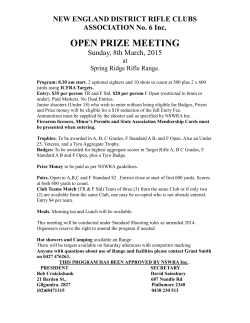
OVERVIEW: CITIES OF LEARNING
OVERVIEW: CITIES OF LEARNING Introduction In our increasingly complex world, learning must expand beyond classroom doors to fully engage young people and provide the array of skills they need to succeed in the 21st century. These young minds, many of whom live in some of our most underserved communities, deserve a life path that provides equal access to opportunity, is driven by their personal passions, and reimagines learning as not just “something you do” but as “something you live." Today, forward-thinking cities across the country are answering that challenge by turning the entire city into a campus for learning anytime and anywhere. These Cities of Learning are part of a national effort powered by a simple idea: What if we organized our communities around learning and creating life opportunities for young people? Cities of Learning activate innovation by using technology to connect the abundant learning opportunities that already exist throughout the community. The Cities of Learning infrastructure creates a network of learning opportunities at libraries, parks, science centers and other organizations, as well as at business internship programs, schools and online. A single, searchable Cities of Learning website makes an enticing and diverse range of learning opportunities visible and accessible to all young people and their parents. Launched in Chicago in 2013, Cities of Learning last year expanded to Dallas, Los Angeles, Pittsburgh, and Washington, D.C. In 2014, 108,000 young people ages 4 to 24 participated in Cities of Learning, earning 160,000 digital badges. This year, Cities of Learning will create cross-community learning pathways with defined sets of badges that allow young people to build expertise in areas like creative writing, theater, and computational making. About Cities of Learning Cities of Learning address key educational needs for local communities, including: • Creating a citywide learning infrastructure. By connecting learning resources across the city into a seamless, searchable network, Cities of Learning help make learning opportunities visible to all young people and their parents. • Encouraging learning engagement. By creating opportunities for young people to follow their interests, learn with peers and build real-world skills, Cities of Learning foster curiosity and resilience and help young people envision how their talents can be applied in real-world settings. • Increasing workforce preparedness. By creating professional skills development and internship opportunities, Cities of Learning give young people the hands-on experiences they need to succeed in the 21st century workplace. • Preventing summer learning loss. With enticing opportunities for young people to learn with their peers during the summer as well as year-round, Cities of Learning help young people maintain or increase the academic gains achieved during the school year. • Leveling the playing field. By making it easy to find and register for camps, classes and learning events, and by providing opportunities for learning engagement, skill building and workforce preparedness, Cities of Learning help level the playing field for kids and teens who don’t otherwise have access to out-of-school enrichment. • Valuing all learning. By creating an infrastructure where youth, parents, educators, employers and others can track learning wherever it happens, Cities of Learning foster innovation and create a culture where learning is a way of life. CITIES OF LEARNING | http://www.citiesoflearning.org Connected learning: An approach for our times Cities of Learning integrate the principles of connected learning, a learning approach that leverages the possibilities of the digital age to make learning more powerful and more relevant to the demands and opportunities of our time. Connected Learning recognizes that learning isn’t limited to school. In fact, learning is stickier when it is connected across a learner’s life. When young people connect in-school academics with out-of-school interests, find supportive social networks that encourage a hobby or skill, and create and produce real things in the real world, they can map out clear and personalized pathways toward a productive and engaged future. Digital badges: Recognizing learning wherever it happens Learning – no matter where it happens – can propel youth forward toward higher pursuits. But until now, only learning that takes place in school has been documented in a way that employers and colleges recognize. Non-traditional students and workers who have learned skills on their own, on the job, or in the military often lack the credentials they need to land a job interview or college placement. That’s why Cities of Learning use digital badges to capture participants’ learning. Like a badge earned in scouting or a letter grade in school, digital badges signify mastery of a skill. But because digital badges can store in-depth layers of information – including the curriculum, examples of work, peer assessments, and evidence of higher-order thinking skills – they can capture a far more complete portrait of the learner. As badging systems grow, young people will be able to share their badges with schools or potential employers to document their readiness for internships, job opportunities, and college admission. Cities of Learning also use badges to create and encourage learning pathways. Each time a young person earns a badge, they are encouraged to try other classes or programs to further build their skills and can thus develop their own cross-community learning pathways. In addition, cities can define a variety of pathways using a series of badges. Each badge unlocks the opportunity to earn the next, culminating in the mastery of specific competencies. Some cities also award pathway completion with access to internship opportunities. In addition, digital badges allow Cities of Learning to produce and collect important data on the learning happening in cities, which in return will offer great potential in terms of how we can better identify learning needs and programming gaps within our communities, cities, and the nation. Each City of Learning is fueled by local public-private partnerships and receives national support from the John D. and Catherine T. MacArthur Foundation and DePaul University’s Digital Youth Network. CITIES OF LEARNING | http://www.citiesoflearning.org CITIES OF LEARNING | http://www.citiesoflearning.org
© Copyright 2025















